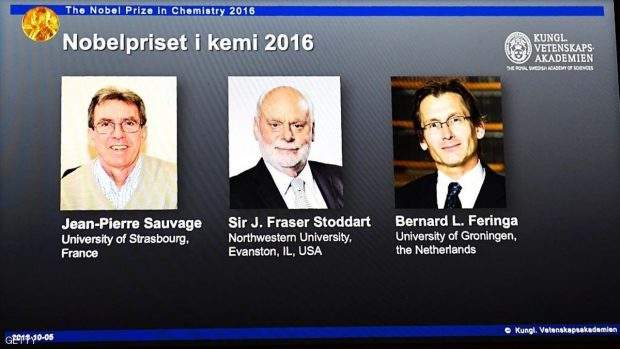2016 Nobel Prize for Chemistry goes to Jean-Pierre Sauvage, Sir Fraser Stoddart and Bernard Feringa

The 2016 Nobel Prize for Chemistry has been awarded for the development of the world’s smallest machines.
Jean-Pierre Sauvage, Sir Fraser Stoddart and Bernard Feringa will share the 8m kronor (£727,000) prize for the design and synthesis of machines on a molecular scale.
They were named at a press conference in Sweden.
The machines conceived by today’s laureates are a thousand times thinner than a strand of hair.
They could slip inside the human body to deliver drugs from within – for instance, applying pharmaceuticals directly to cancer cells.
This field of nanotechnology could also yield applications in the design of smart materials.
The prize recognises their success in linking molecules together to design everything from motors to a car and muscles on a tiny scale.
“They have mastered motion control at the molecular scale,” said Olof Ramström, from the Nobel Committee.
Reacting to the award, Prof Feringa said: “I don’t know what to say, I’m shocked. And my second remark was: ‘I’m a bit emotional about it’.”
The celebrated physicist Richard Feynman is often credited with inspiring the concept of molecular machines.
In a lecture at the California Institute of Technology (Caltech) in 1959, titled “There’s plenty of room at the bottom”, he considered the possibility of the direct manipulation of matter at the atomic scale.
It was also in this lecture that he introduced the idea of “swallowing the surgeon”
How to submit an Op-Ed: Libyan Express accepts opinion articles on a wide range of topics. Submissions may be sent to oped@libyanexpress.com. Please include ‘Op-Ed’ in the subject line.
- Libya’s HCS invites applicants for key state roles - December 31, 2023
- UK calls on Iran to prevent escalation in Israel-Hamas conflict - November 05, 2023
- Libyan Interior Minister: Immigrant shelter costs a fortune - November 05, 2023


